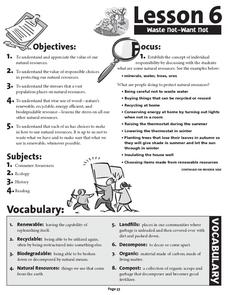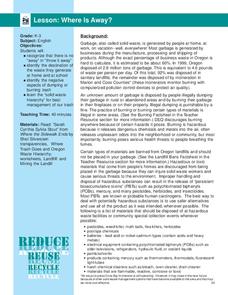Curated OER
Being Resource-ful
Learners compare the amount of waste that comes from different bags of equivalent amounts of potato chips and decide which would produce the least amount of waste. They discuss recycling and other ways they can reduce waste.
Curated OER
Collective Compromise
Middle schoolers explore the concept of philanthropy. In this service learning lesson plan, students examine what to do with waste as they plan and implement a strategy for controlling their school's trash.
Curated OER
Household Hazardous Waste Identification
Fourth graders discuss the concept of reduce, reuse and recycle. They identify products in their homes that are hazardous and discover alternatives to them. They examine the inventory of other classmates hazardous materials.
Curated OER
Waste and Our World Technology Project
Fourth graders recognize that human activity can lead to the production of waste, and identify alternatives for the responsible use and disposal of materials. They use technology to investigate and then present a multimedia presentation.
Curated OER
The Waste-Free Lunch
Reusable packaging for school lunches seems like a wonderful and eco-friendly idea; however, some children are being chastised for not following one school's guidelines. This New York Times article engages learners in reading...
Curated OER
Chemical Consequences of Burning Fossil Fuels
Future scientists are introduced to the chemical consequences of burning fossil fuels, learning that fossil fuel combustion leads to the formation of oxides of three nonmetals: carbon, nitrogen, and sulfur, all of which end up in the...
Curated OER
Waste Not Want Not
Students are introduced to the need to save natural resources. Through inquiry, hands-on activities, and problem solving, students increase their understanding of solid waste materials and the need to reduce, recycle, and reuse.
Curated OER
The Miracle Resource - From Forest to Products
Young scholars create a collage of wood products labeled by type of wood product. In this product engineering lesson, students work in groups to find pictures of solid wood products, engineered wood products, wood pulp, paper products,...
Curated OER
Simple Everyday Products
Fourth graders investigate the origin of products and how they are manufactured from natural resources. They draw the production cycle and discuss how one could help reduce the number of natural resources that are used. They also...
Curated OER
Solid Waste Management
Sixth graders examine the role of packaging of everyday products and urge manufacturers to reduce the amount of it. They also discover how many products they use everyday can be recycled.
Curated OER
Waste, Then and Now
Students discuss and compare the waste disposal habits of today with those of Native Americans of long ago.
Curated OER
What's Up with Waste?
Fifth graders design a brochure that identifies types of solid waste that are often improperly disposed, explains the effects of this disposal and proposes a solution to the problem. The read humorous books, define vocabulary words and...
Curated OER
Green Chemistry
The principles of pollution control on a molecular level are summarised here. The reasoning and study behind the principles are described, and your class will undestand how some techniques are developed to be more efficient.
Curated OER
Water Balance & Nitrogenous Waste Removal
Examine the structures of the kidney and then define the functions of the specialised structures. Every will find this powerpoint engaging, many of the images will present facts such as osmolarity of interstitial fluid and the negative...
California Academy of Science
Your Hidden Water Footprint: Defining a Problem to Find a Solution
One 17-ounce bottle of Cola requires around 46 gallons of water to produce. How is that possible? Young scientists learn about the hidden water used to produce everyday items. They research, discuss, and look for ways to reduce water...
Advocates for Human Rights
The Right to a Clean Environment in the United States
Even if a school has gone digital, chances are there's still plenty of paper being used. The three activities help scholars learn about the environmental impact of paper and another consumer products of their choosing, the issue of...
California Academy of Science
Rapid Brainstorming: How Can We Improve Our Global Food System?
In 2018, the average fast food burger cost $2.64 while a salad averaged $4.14. Does the price difference matter to public health? Scholars consider that question and others in a brainstorming session about improving our global food...
Radford University
Ping Pong Packing
Bounce off some ideas to reduce the amount of wasted space. Teams work together to determine the best size and shape of container to package a large order of ping pong balls. Groups are to design the container to reduce the amount of...
Curated OER
MY REDUCE/REUSE STORY
Students go through old magazines and select pictures of things which ultimately become a waste product. They paste these pictures into a small "recycling" book. They dictate a story about reuse and/or recycling of these materials.
Curated OER
Carbon Dioxide
Students conduct a series of experiments to explore carbon dioxide properties. In this chemistry lesson, students explain the production and uses of this gas. They measure its amount in soda and waste product of yeast.
Curated OER
Sludge
Students become familiar with the idea that sludge is a waste product but can also be a resource, depending on its characteristics and how we manage it. They read information and answers questions on a worksheet imbedded in this plan.
Curated OER
Fashion Forward, Fashion Functional
Young scholars consider the implications of waste. In this waste streams lesson, students learn what waste streams are and identify their impact on the environment. Young scholars also recycle waste materials to create functional objects.
Curated OER
Lunchroom Trash
Students explore the amount of waste produced by humans. For this ecology lesson, students predict which lunch bag and its contents will produce the most waste. Leftover material is examined, amounts are recorded, and a bar graph is...
Curated OER
Where Is Away?
Students explore ways to dispose of trash. In this lesson, students discuss where trash goes when it leaves their house and other inappropriate ways to dispose of trash. Students brainstorm ways to produce less waste.

























